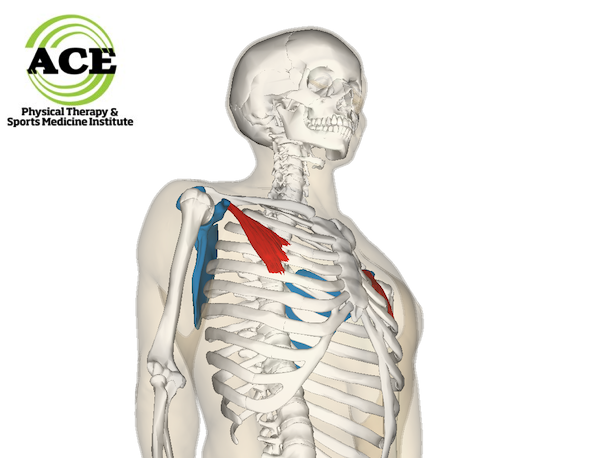ALTHOUGH RARE, PECTORALIS MINOR INJURIES CAN OCCUR

Tid Bits of Info
- The Pectoralis Minor (PMi) stabilizes the scapula and assists in breathing.
- “Rounded shoulder” posture can lead to a chronically “shortened” PMi.
- PMi originates from the 3-5 ribs.
- Treatment for an injury to the PMi is conservative and usually does not require surgery.
- Seek the advice and treatment of a PMi injury from a Physical Therapist.
The chest wall is covered with muscles to help protect the vital organs and move the upper extremities. The most prominent chest wall muscle is the Pectoralis Major (PM) and directly under it lays the Pectoralis Minor (PMi). An impaired PMi can trigger pain in a variety of points like shoulder, elbow, forearm, and hand. It can even effect breathing limit movement on the affected side. Unfortunately, diagnosis is difficult and it’s possible to confuse a Pectoralis Minor Injury with a Pectoralis Major injury. Treatment is different for both injuries, so proper diagnosis is vital for proper treatment.
The PMi originates off of the ribs and inserts on to the coracoid process of the scapula. The action of the PMi is to help stabilize the scapula and assist in breathing. It is most active when the shoulder joint moves into flexion, adduction and internal rotation. If the PMi is injured the symptoms can present as pain in the shoulder, anterior chest or both. Injuries to this muscle usually occur due to excessive, quick movements of the involved shoulder joint into abduction, extension and external rotation. These motions can cause excessive force to be applied to the tendon, musculo-tendinous junction or both. Damage to the soft tissue can lead to an injury of the PMi.

Injuries to the PMi typically occur due to a combination of factors. Any time the shoulder joint is moved with great force into abduction, extension and external rotation there is an excessive eccentric (lengthening of the muscle fibers) load applied to the muscle fibers and its tendinous attachment. This load can occur secondary to a direct blow to the front of the shoulder/chest. If someone has poor shoulder posture (“rounded shoulders”), the PMi can become chronically shortened and is more susceptible to injury when it is stretched forcefully and quickly. Similar to any soft tissue, if someone constantly places an abnormal amount of force upon the PMi it can weaken and eventually be damaged.
Diagnosing a PMi injury is very difficult to do and many times mistakenly diagnosed as a PM injury instead of a PMi injury. In many instances, imaging studies (MRI or CT scan) are required to confirm an injury to the PMi. Healthcare professionals need to get a very detailed history of the mechanism of injury. If the injury occurred due to a direct blow to the front of the shoulder/chest or a forceful movement of the shoulder into the directions of extension, abduction and external rotation a PMi injury should be considered as a possibility of the cause of the symptoms.
Treatment of a PMi injury differs significantly from a PM injury. The PM injury requires surgery to restore it to its anatomical position and enable full functional capabilities to return. The PMi injury is almost always treated conservatively without surgery. The injured tendon is allowed to rest for several weeks and standard protocols for acute soft tissue injuries are utilized. When the symptoms lessen in intensity, the muscle and tendon are slowly engaged in an exercise routine that will restore the strength and function of the PMi.
An isolated PMi injury is rare but can occur if certain conditions/factors take place. The injury can cause a great deal of pain and limit the functional capabilities of the involved shoulder due to the pain and eventual reduced stability of the scapula that is provided by a healthy PMi.
